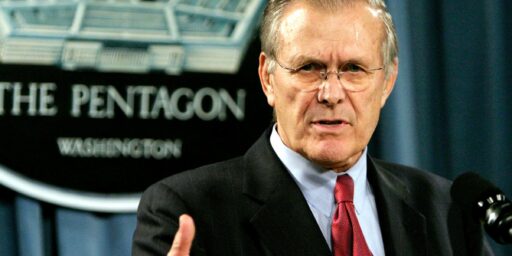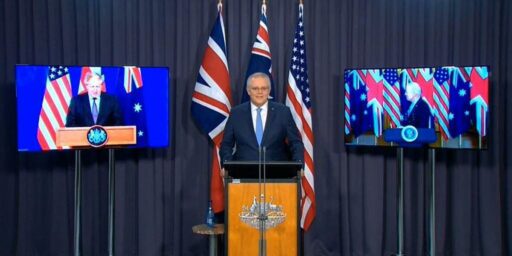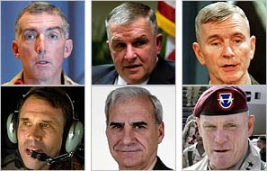France Described as Key Intelligence Ally
According to Dana Priest, American and French authorities collaborate on an effective intelligence service:
Help From France Key In Covert Operations (WaPo)
Funded largely by the CIA’s Counterterrorist Center, Alliance Base analyzes the transnational movement of terrorist suspects and develops operations to catch or spy on them.
Alliance Base demonstrates how most counterterrorism operations actually take place: through secretive alliances between the CIA and other countries’ intelligence services. This is not the work of large army formations, or even small special forces teams, but of handfuls of U.S. intelligence case officers working with handfuls of foreign operatives, often in tentative arrangements.
Such joint intelligence work has been responsible for identifying, tracking and capturing or killing the vast majority of committed jihadists who have been targeted outside Iraq and Afghanistan since the Sept. 11, 2001, attacks, according to terrorism experts.
The CIA declined to comment on Alliance Base, as did a spokesman for the French Embassy in Washington.
Most French officials and other intelligence veterans would talk about the partnership only if their names were withheld because the specifics are classified and the politics are sensitive. John E. McLaughlin, the former acting CIA director who retired recently after a 32-year career, described the relationship between the CIA and its French counterparts as “one of the best in the world. What they are willing to contribute is extraordinarily valuable.”
The rarely discussed Langley-Paris connection also belies the public portrayal of acrimony between the two countries that erupted over the invasion of Iraq. Within the Bush administration, the discord was amplified by Defense Secretary Donald H. Rumsfeld, who has claimed the lead role in the administration’s “global war on terrorism” and has sought to give the military more of a part in it.
But even as Rumsfeld was criticizing France in early 2003 for not doing its share in fighting terrorism, his U.S. Special Operations Command was finalizing a secret arrangement to put 200 French special forces under U.S. command in Afghanistan. Beginning in July 2003, its commanders have worked side by side there with U.S. commanders and CIA and National Security Agency representatives.
Priest refrains from delving too deeply into the political implications of the Alliance Base. But one interpretation is that key collaborations take place despite the Bush administration’s obstructive policies. In other words, if Rumsfeld and company were more open to French input, counterterrorism efforts would be even better than they are.
A different interpretation is that, contrary to the standard media line, the administration — or, at least, the intelligence apparatus that it oversees — is more engaged in global cooperation than it’s often characterized. The Alliance Base demonstrates that, in the end, the administration knows a solid national-security program when it sees one, and it more or less does the right thing.
In general, I tend to side with the latter interpretation. The Proliferation Security Initiative has produced results, and from Priest’s report, the Alliance Base seems akin to it. On the other hand, the following raises some questions (emphasis added):
In the run-up to the Iraq war, the White House drew the battle lines between countries that were tough on terrorists — the administration included Iraq in the mix — and those that were not. France’s government believed U.N. inspections had successfully contained Saddam Hussein’s development of weapons programs, and Bruguiere saw no connection between Iraq and al Qaeda. At the Defense Department, on Capitol Hill and elsewhere, many cast France’s opposition to war as evidence it was a slacker when it came to fighting terrorism.
French fries became “freedom fries” on Air Force One and in congressional cafeterias. Rumsfeld prohibited general officers from telephoning their French counterparts, grounded U.S. planes at the Paris Air Show and disinvited the French from Red Flag, a major U.S. military exercise in which they had participated for decades.
Three months into the dispute, the State Department and the CIA made a case for France, citing its intelligence cooperation. Bush eventually told Rumsfeld to desist, according to two former State Department officials. Then-Secretary of State Colin L. Powell wrote a memo saying that punishing the French was not U.S. policy. A. Elizabeth Jones, the assistant secretary of state for European and Eurasian affairs, kept it on top of her desk. “I frequently needed to be able to pull it out and quote it to my Pentagon colleagues,” Jones said.
But Rumsfeld persisted a year later, excluding the French Air Force from the Red Flag exercise in 2004.
Rumsfeld’s symbolic jabs baffled some officials inside the Bush administration. “Most things the secretary of defense did I could understand, even if I disagreed with him,” said Lawrence B. Wilkerson, former chief of staff to Powell. “On this one, it was totally irrational, even dumb.”
Actually, I don’t find “Rumsfeld’s symbolic jabs baffl[ing]” at all. Besides whatever animus he may have toward France, he also looks at the CIA with tremendous skepticism, going as far as to create the Strategic Support Branch, which functions almost as “a rival service.” A France-CIA network is likely at the bottom of Rumsfeld’s wish list.
In this light, the Alliance Base is perhaps markedly different to the PSI and thus hardly a paragon of cooperation. Whatever the case, I think it’s good that such a French-American center exists.






Rumsfeld doesn’t want to work with the French no more than he wants to work with Necroponte. He feels that the Pentagon should be running the show, not the CIA or any Intelligence “tsar”.
Sorry the French as allies? Everything I have seen indicates that Dracula is more trusted in a blood bank than the French AS ALLIES. are WE TO BELIEVE THIS ACCOUNT? I doubt its accuracy and what it attempts to convey.
Hello from Brazil,
I agree with TJ Jackson,
The French are the only true friends USA have had.
Helas it seems that many had more interest in money than in true friends.
By chance the secret services has no political agenda and know better that the interest of USA is in full cooperation with France.
Important to remember that France fight the Islamic since the 70’s .